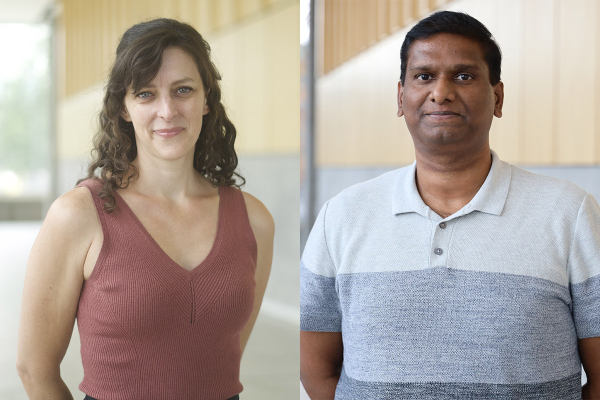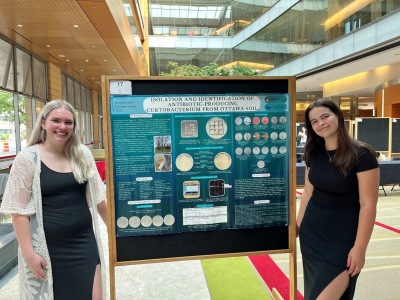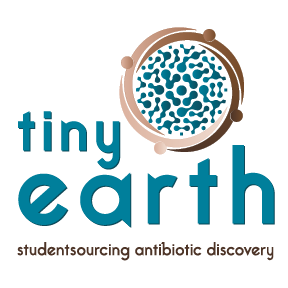 Drs. Laura Pickell and Anil Gollapudi of Carleton University are two of only twelve Tiny Earth Partner Instructors (TEPIs) in Canada, and their involvement in the network has grown significantly since they first joined the Tiny Earth network in 2022. In the past year and a half, they implemented Tiny Earth, developed a student poster competition, and organized additional outreach programs for their Tiny Earthlings. In the coming year, they also plan to become Certified TEPI Trainers. Pickell and Gollapudi are particularly interested in increasing engagement with their students both in and outside the classroom. By creating opportunities for their students beyond the laboratory, they hope to enable Tiny Earthlings to see themselves as real scientists with the power to make an impact.
Drs. Laura Pickell and Anil Gollapudi of Carleton University are two of only twelve Tiny Earth Partner Instructors (TEPIs) in Canada, and their involvement in the network has grown significantly since they first joined the Tiny Earth network in 2022. In the past year and a half, they implemented Tiny Earth, developed a student poster competition, and organized additional outreach programs for their Tiny Earthlings. In the coming year, they also plan to become Certified TEPI Trainers. Pickell and Gollapudi are particularly interested in increasing engagement with their students both in and outside the classroom. By creating opportunities for their students beyond the laboratory, they hope to enable Tiny Earthlings to see themselves as real scientists with the power to make an impact.
Dr. Pickell’s journey to becoming a TEPI started when she completed her PhD in Human Genetics from McGill University at the Montreal Children’s Hospital. While working as a Teaching Assistant, she grew a particular interest in education. As a result, she pursued and completed a program in Science Teaching. She then went on to teach in the Science and Nursing programs at Heritage College in Hull, Quebec, for ten years before joining Carleton University in 2020 in Ottawa, Canada.
Dr. Gollapudi obtained his doctorate in Biotechnology from the Indian Institute of Technology in Bombay, India, and worked at the EdTech company Toppr Technologies Pvt. Ltd. before moving to Ottawa in 2019 to pursue a career in academia. He has been a Lab Coordinator at Carleton University since 2021.
The two colleagues participated in the 2022 TEPI training at Johns Hopkins University. Both are strong proponents of experiential learning, which is what sparked their interest in the Tiny Earth curriculum. They believe that providing students with a lab experience that encourages them to create their own research questions is more valuable in the long run compared to traditional science labs. Tiny Earth just “fell into place” at their institution, because it fit their curricular expectations and satisfied the need for a course that stresses hands-on learning.
“The level of engagement and interest that has been developed from doing Tiny Earth in the students has been beyond what I could have imagined.” —Laura Pickell

Carleton students Carlee Pearn and Ainsley Lewis present at the 2023 Tiny Earth Summer Symposium.
Additionally, the two TEPIs implemented a fun way to increase engagement among students: a poster competition. Every pair of students in the course creates and presents a research poster for their final project. Four winners are selected to present their work at Carleton University’s Health Science Research Day alongside graduate students. One of the four pairs is then selected to present their poster at the Tiny Earth Summer Symposium, where students showcase their research, gain additional insight into antibiotic research around the world, and network with fellow Tiny Earthlings and experts in the field. Dr. Gollapudi notes that the poster competition is a big motivator for students to do their best on their posters. Attending the symposium also inspires them to learn more about scientific research, fulfilling an important hallmark of a course-based undergraduate research experience (CURE).
“They feel like they [the students] are contributing to something: they’re in charge of their own work, they’re having to troubleshoot, they’re seeing that even if they fail at something if they continue to come back and try again that they’ll eventually get it. They’re working and building their persistence in science as well. The benefits are just unbelievable…[Attending the symposium] really expanded their opportunities — they could see what it’s like to continue on in science, what others are doing, and hopefully, it will motivate them to persist in science because they can see the possibilities that can come from their work…” —Dr. Laura Pickell
The pair of instructors also implemented an outreach project for high school students from all over Ottawa last May in collaboration with the Mini-Courses Program (MCP) at Carleton University. High school students who signed up completed a week-long mini Tiny Earth project, and Tiny Earth undergraduates from the previous year volunteered and helped out the students during the week. They are planning to continue teaching this mini-project in the future.
Additionally, they hope to become Certified TEPI Trainers and plan to host Tiny Earth Trainings for other Canadian instructors in the future. Limited time and resources for travel are significant barriers preventing Canadian science instructors and researchers from attending training in the United States. Although Tiny Earth offers virtual training, establishing a training location in Canada would make training more accessible and address the growing interest for CUREs in the country. A Candian base for TEPIs may also act as a support system making course implementation smoother and more effective.
When prompted about their advice for prospective TEPIs, they both said to “just do it.” They emphasized the ease of implementation and the flexible curriculum that can be implemented in any setting at any budget. Drs. Pickell and Gollapudi especially stressed the impact that Tiny Earth has had on students, mentioning that there have been undecided students deciding to pursue research after graduation.
“At the start, I asked many students what their end goal was after graduating from university, and a lot of them didn’t have a clear picture. But after, some of them tell me they now want to do research or they want to do something in microbiology. These are the kind of answers I’m getting, after [only] a three month span.” – Dr. Gollapudi
Thank you Dr. Laura Pickell and Dr. Anil Gollapudi for your contributions to your students, antibiotic research, and Tiny Earth!
—Melis Baskaya, Tiny Earth Communications & Media Intern

